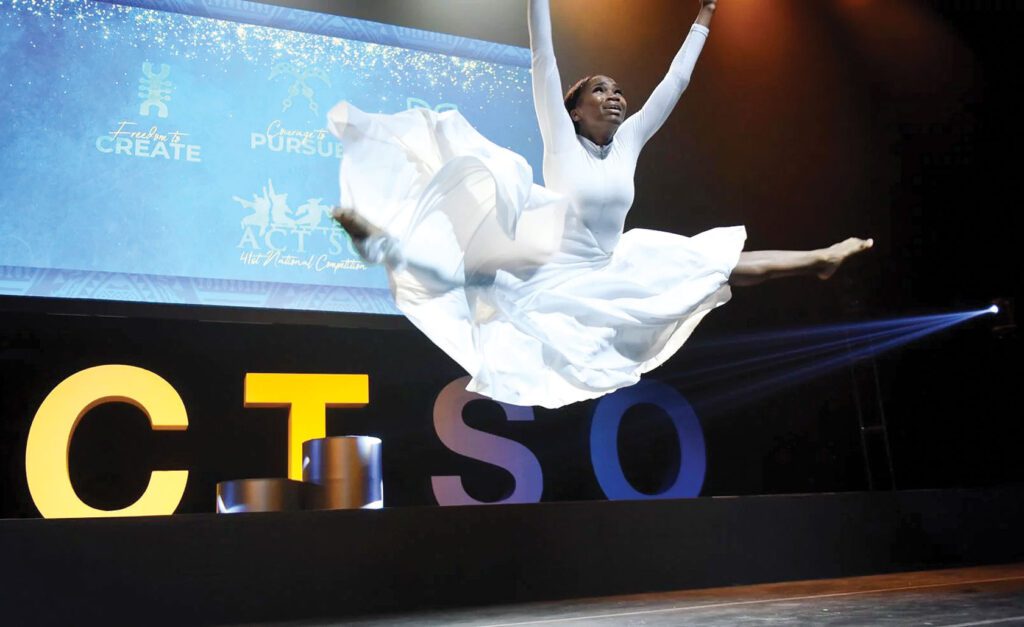At academic olympics, students ‘act so’
Arts & science competition inspires new leaders

As the NAACP’s national convention comes to Boston, teens from across the country will show off their skills in arts and science in the organization’s youth competition. The Afro-Academic, Cultural, Technological and Scientific Olympics, or ACT-SO, lets young people compete for college scholarships and other prizes.
“It makes opportunities for young creators and thinkers to be seen and heard as leaders,” said ACT-SO national director Larry Brown Jr. He added that the program also lets teens build relationships. “It fosters community, with interdisciplinary support systems, coaching sessions and mentoring. And ACT-SO lets (participants) make friends with young people like themselves.”
Since ACT-SO’s inception in 1978, more than 300,000 high school students have participated in the competition. The late Vernon Jarrett, then a Black columnist for the Chicago Tribune, started a local academic olympics and persuaded the NAACP to adopt it and expand it nationwide. The acronym was intended to signal teens that if they want to be successful, then “act so.”
Each fall, local NAACP branches begin recruiting teens. Participation is free for the students, who get to attend community events and meet local leaders. Throughout the school year, the participants work with coaches assigned to them as they develop their projects for competition.
“Our coaches are directly involved, giving them regular feedback on their projects,” explained Brown. “Students work with coaches from the impetus of their project until it’s time to present it.”
ACT-SO offers a wide range of categories covering 32 fields of interest. They include health, architecture, computers and mathematics. The performing arts category includes dance, acting and music. Young people interested in filmmaking, photography, drawing or painting can compete in the visual arts category. Competitors in the humanities write music, short stories, essays or poetry. Students can even compete in entrepreneurship or cooking.
NAACP branches recruit community members and local experts as judges. Top winners of the local competitions go on to compete nationally, bringing their projects to the national convention.
This year’s other convention attendees can have a look at the ACT-SO projects. Science and visual arts projects will be on display, and the convention kickoff will feature ACT-SO participants in the performing arts. Culinary projects will be part of a tasting event.
The Boston area boasts several students in the ACT-SO national competition. Participants from South Boston, Milton, Brockton and Lowell will present their projects at the convention. The winners will be announced July 29. Their categories include poetry, tap dance, earth science, classical music and chemistry.
Kayla Thugi, a high school senior from Brockton, is competing in both drawing and poetry performance.
Her self-portrait, titled “Irrevocable Imprints,” uses white pencil, along with the colors of the Kenyan flag — black, red and green — to represent Thugi’s ancestry. ““The hardest part of drawing was using black paper for the first time,” she said. “And it’s a large-scale drawing.”
Thugi thinks of drawing as a hobby. “It’s a way to express myself, but I really want to do writing, like maybe journalism,” she said.
Thugi entered the poetry competition after a friend saw her perform an original poem. “She texted me the link to the program, and I was happy to be accepted on such short notice,” she said. “With my poetry, I’m really trying to relate to my audience.”
“I’m learning a lot about history and culture,” she added. “For example, I didn’t know about the Harlem Renaissance. It showed me that African American history is not just slavery and the civil rights movement, but that we draw, we create, we move. I find it so powerful that we’re filling the shoes of the people that came before.”
Tanisha Sullivan, president of the Boston branch, has said she was introduced to the NAACP when she competed in ACT-SO.
Brown was also a youthful entrant.
“I competed in oratory in 12th grade, but I didn’t win,” he recalled with a laugh. “They said I talked too fast.”
He still talks fast, in his enthusiasm for the program. “ACT-SO has produced people who are changemakers,” Brown said.
Previous ACT-SO competitors include jazz trumpeter Roy Hargrove; Tony Award-winning actor Myles Frost, who plays Michael Jackson in “MJ the Musical;” and Anthony Burrell, a choreographer who has worked with Beyoncé, Rihanna, Katy Perry and Mariah Carey.






